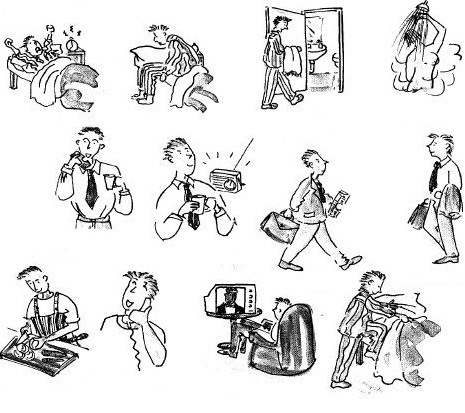
Suplemento educativo
What do you do everyday? / ¿Qué haces todos los días?
Simple Present / Presente simple
Por Estela González Torres
October 2014• Something that is always true or usually true. You speak two languages.
• A habit or routine. We always have lunch here.
• Fixed timetables. The train leaves at 9 a.m.
When it comes to habits, routines or traditions, we use time expressions. They are called adverbs of frequency and they show how often something happens.
100% always/daily
80% usually/ normally
60% often/frequently
40% sometimes
10% hardly ever/rarely
0% never
Adverbs of frequency come:
• Before main verbs.
I always have baseball on Fridays.
• After the verb to be.
We are normally tired after work.
Other time phrases are:
ONCE
TWICE
THREE TIMES a day/week
EVERY Monday/day/weeek/time/month/year
ON Mondays/Tuesdays..
Time phrases go:
• At the beginning of a sentence. On Mondays he eats at his mom's.
• At the end of a sentence. I have yoga twice a week.
She goes down to NYC every weekend.
The present simple always goes with do/does.
| QUESTIONS | POSITIVE ANSWER (+) | NEGATIVE ANSWER (-) |
| Do you work in Hudson? | Yes, I do. Yes, I work in Hudson. | No, I do not (don't). No, I do not (don't) work in Hudson. |
| Does she live in Kingston? | Yes, she does. Yes, she lives in Kingston. | No, she does not (doesn't). No, she does not (doesn't) live in Kingston. |
REMEMBER: He/she/it add add -s to the verb
He likes fishing. She plays tennis. It eats a lot.
If the verb ends by consonant + -y, the ending changes into -ies with he/she/it. For example: study > studies: He studies at Bard.
And it adds -es to verbs ending in vowel and -x, -ss, -sh, -ch:
- go > goes: She goes to school every day.
- pass > passes: The dog passes through the little door.
- catch > catches: He catches the bus at 8 every day.
- fix > fixes: She fixes everything in the house.
- push > pushes: It pushes down.
What does Juan do every day?
Write Juan's daily routine. Do not forget to include adverbs of frequency or time phrases. You can also write the time (at 8 am, at 1 pm...) or moment of the day (in the morning, in the afternoon, in the evening, at night).
Answer Key: Juan wakes up very early every morning and he gets up 5 minutes later. He goes straight to the toilet and he takes a shower. Then, he has breakfast while he listens to the radio. He goes to work at 8 am and he finishes at 6 pm. He walks home and he cooks around 7 pm. In the evening, he calls his friends and he wacthes tv. He goes to sleep at 11 pm.
La Voz, Cultura y noticias hispanas del Valle de Hudson
La Voz, Cultura y noticias hispanas del Valle de Hudson
Comments | |
| Sorry, there are no comments at this time. |

